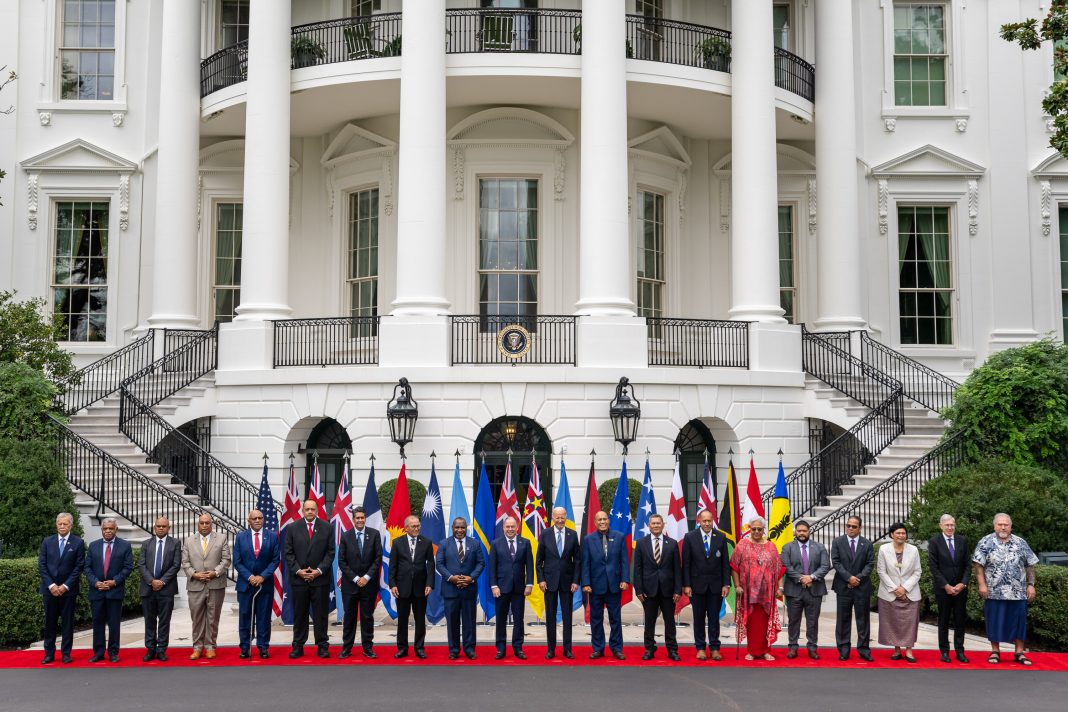U.S President Joe Biden met Pacific island leaders for a second White House summit on Monday, part of a charm offensive aimed at curbing further inroads by China into a strategic region that Washington has long considered its own backyard.
Before welcoming the island leaders, gathered under the umbrella of the 18-nation Pacific Islands Forum, Biden announced U.S diplomatic recognition of two more Pacific islands nations, the Cook Islands and Niue.
U.S officials said the United States would also promise new money for infrastructure for the region, including to improve internet connectivity via undersea cables.
“The United States committed to ensuring (an) Indo-Pacific region that is free, open, prosperous and secure. We’re committed to working with all the nations around this table to achieve that goal,” Biden said at the welcoming ceremony.
The U.S would work with Congress to provide US$40 million to support “secure, sustainable, and resilient infrastructure” in the region and also with partners, including Japan and Australia, to support inclusive, climate-resilient economic development, an official said.
In referring to the plan at the welcoming, Biden mistakenly gave the amount as US$40 billion, instead of $40 million, a U.S official said.
Cook Islands Prime Minister Mark Brown, the Forum’s chair, called the summit “an opportunity … to develop our partnerships for prosperity.”
He urged Washington “to actively engage at the highest level” in the 52nd Pacific Island Forum leaders meeting he would host in a few weeks to endorse its 2050 plan.
Biden hosted an inaugural summit of 14 Pacific island nations a year ago and was to meet them again in Papua New Guinea in May. That meeting was scrapped when a U.S debt- ceiling crisis forced Biden to cut short an Asia trip.
Last year, his administration pledged to help islanders fend off China’s “economic coercion” and a joint declaration resolved to strengthen their partnership, saying they shared a vision for a region where “democracy will be able to flourish.”
The White House said this year it would focus on priorities including climate change, economic growth, sustainable development, public health and countering illegal fishing.
Biden said recognising the Cook Islands and Niue as sovereign and independent states would “enable us to expand the scope of this enduring partnership as we seek to tackle the challenges that matter most to our peoples’ lives.”
He said the U.S had a long history of cooperation with the Cook Islands, dating back to World War Two, when the U.S military built airport runways in one if the chain’s atolls. He said Niue played “a critical and constructive role in the Pacific,” including by supporting sustainable development, security, and marine protection and ocean conservation.
In Baltimore on Sunday, Pacific island leaders visited a Coast Guard cutter in the harbor and were briefed on combating illegal fishing by the Commandant of the Coast Guard.
They also attended Sunday’s National Football League game between the Baltimore Ravens and the Indianapolis Colts. Dozens of NFL players are of Pacific Islander heritage.
Solomon Islands Prime Minister Manasseh Sogavare, who has deepened his country’s ties with China, will skip the summit. A senior Biden administration official said the U.S was “disappointed” by Sogavare’s decision.
Washington appears to have made no progress on offers of substantial infrastructure funding and expanded aid to the Solomons. Sogavare visited China in July, announcing a policing agreement with Beijing that builds on a security pact signed last year.
The White House in 2022 said the U.S would invest more than US$810 million in expanded programs to aid the Pacific islands.
Meg Keen, director of Pacific Island Programs at Australia’s Lowy Institute, said that while the U.S had opened new embassies and USAID offices in the region since last year’s summit, Congress had yet to approve the funds.
She added that Pacific island countries “welcome the U.S. re-engagement with the region, but don’t want geopolitical tussles to result in an escalation of militarisation.” Vanuatu Prime Minister Sato Kilman is also not attending the summit. He was elected by lawmakers two weeks ago to replace Ishmael Kalsakau, who lost a no-confidence vote for actions including signing a security pact with U.S ally Australia.
The U.S is still negotiating to open an embassy in Vanuatu, but has not significantly increased engagement with the nation, which counts China as its largest external creditor. China signed a policing agreement with Vanuatu last month.
A senior Biden administration official said the U.S was on track to open the Vanuatu embassy by early next year and that other Vanuatu officials would attend the summit.
Fiji has welcomed the stronger U.S. regional presence as making the Pacific “more secure,” but Kiribati, one of the most remote Pacific island states, 2,500 miles (4,000 km) southwest of Hawaii, said this year it plans to upgrade a former World War Two airstrip with Chinese assistance.
Washington renewed agreements this year with Palau and Micronesia that give it exclusive military access to strategic parts of the Pacific, but has yet to do so with the Marshall Islands, which wants more money to deal with the legacy of massive U.S nuclear testing in the 1940s and 50s.
SOURCE: THE HILL/PACNEWS














